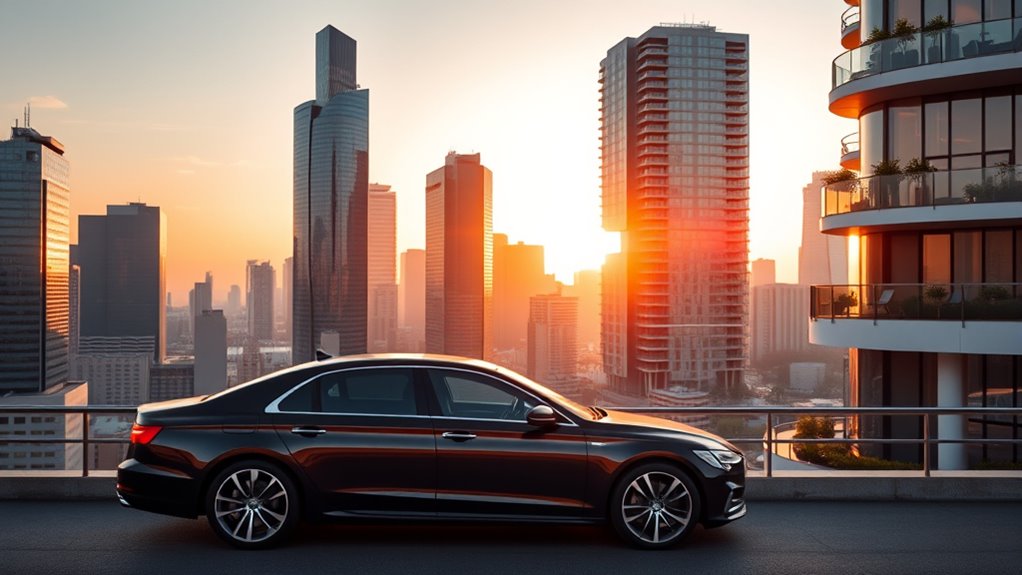When you lease a vehicle, you give up building equity—the ownership stake you’d gain with each payment. However, if your goal is to enjoy a new car every few years, save on upfront costs, and avoid hassles like selling or trading, leasing may suit you better. While you miss out on long-term asset growth, focusing on your personal financial priorities might reveal that the trade-off isn’t as important as you think. Explore more to understand why this might be the case.
Key Takeaways
- Leasing does not build equity, meaning you won’t own the vehicle or benefit from its potential appreciation.
- The main trade-off of leasing is sacrificing long-term asset accumulation for lower monthly payments.
- For short-term needs, leasing offers convenience and cost savings over buying, which builds equity over time.
- Leasing may be financially advantageous if you prefer driving new cars frequently without worrying about resale value.
- Understanding the value of equity helps clarify whether leasing aligns with your long-term financial and personal goals.

If you’re leasing a car instead of buying, you might be overlooking what you’re giving up: the opportunity to build equity. When you buy, every payment you make chips away at the car’s loan balance, gradually increasing your ownership stake. That’s equity—your real asset—something you can sell or trade later. Leasing, on the other hand, is often portrayed as more flexible and less burdensome upfront, but it comes with limitations. While lease advantages include lower monthly payments and the ability to drive a new car every few years, they also mean you’re not accumulating any ownership stake in the vehicle. Instead, you’re paying for the right to use it during the lease term, without any equity buildup. This can feel like throwing money into a black hole, especially if you’re the type who prefers long-term value over short-term savings.
Financial flexibility is often cited as a key reason to lease. Leasing can free up cash flow since monthly payments tend to be lower than loan payments, and you’re not tying up a large sum in a car that’s depreciating the moment you drive it off the lot. Plus, leases usually come with predictable costs—less worry about unexpected repair expenses once the warranty covers most issues. This setup appeals to those who want to avoid the hassle of selling or trading in a car later. However, it’s essential to recognize that this flexibility is a double-edged sword. You’re limited in how many miles you can drive annually, and excess mileage can lead to costly penalties. At the end of the lease, you return the vehicle, losing any residual value it might have had if you’d kept it longer and maintained it properly.
Another consideration is that leasing may seem advantageous in the short term, but over time, it can be more expensive than buying if you continuously lease new vehicles. If you’re someone who keeps cars for many years, buying can build significant equity, ultimately saving you money. But if your priority is always having the latest features and avoiding long-term commitments, leasing makes sense. Ultimately, whether leasing advantages outweigh the loss of equity depends on your personal financial goals and driving habits. If you’re comfortable with never owning the car outright and prefer the convenience and lower payments, leasing can be a strategic choice. Just remember, that sense of ownership and the ability to build equity are lost with each lease—something worth considering as you weigh your options.
Additionally, understanding the concept of home equity can help clarify what you’re sacrificing; just as homeowners build equity over time, vehicle ownership allows you to accumulate value that can be leveraged later.
Frequently Asked Questions
How Does Leasing Impact My Credit Score Long-Term?
When considering the lease impact on your credit score, it’s important to know that timely payments can boost your credit, but missed ones hurt it. Leasing shows up as a new account and can temporarily lower your score, yet consistent, on-time payments build positive credit implications over time. Overall, leasing may not substantially hurt your long-term credit, especially if you manage payments responsibly and keep your credit utilization low.
Can Leasing Options Be Customized for Specific Financial Situations?
Imagine your financial journey as a tailored suit—leasing options can be customized to fit your unique needs. With flexibility in customization, you can adapt lease terms to match your financial situation, providing greater control and peace of mind. Whether you need shorter terms, lower payments, or specific mileage limits, leasing offers the flexibility to align with your financial goals. This customization flexibility makes leasing a practical choice for tailored financial planning.
What Are Hidden Costs Associated With Leasing That I Should Know?
When considering leasing, watch out for hidden fees like excessive wear charges or early lease termination costs. These can catch you off guard if you decide to end the lease early or return the vehicle with more damage than allowed. Always read the fine print to understand potential costs, so you’re not surprised by charges for lease termination or other unexpected fees that could add up beyond your initial budget.
How Does Leasing Affect My Ability to Buy a Home Later?
Imagine missing out on a key step toward homeownership. Leasing can introduce lease restrictions that limit your flexibility, and it might affect property eligibility later. These factors could slow down your path to buying a home, but they don’t block it entirely. If you plan carefully, leasing can be part of your journey, giving you time to save and improve your financial standing before making that big leap.
Are There Lease-To-Own Options That Combine Benefits of Both?
You might find lease-to-own options appealing because they combine benefits of both leasing and buying through hybrid financing. These agreements let you rent a property with the option to purchase later, giving you time to improve your credit or save for a down payment. This approach lets you test the property while building equity, making it a flexible way to move toward ownership without fully committing upfront.
Conclusion
So, when you lease, you’re letting go of building your financial garden, watching others harvest their own. It’s like renting a boat—you enjoy the ride, but the treasure stays out of reach. While it might feel like giving up a piece of your future, sometimes the freedom and flexibility make the sacrifice worth it. Remember, whether you own or lease, your journey is yours—just choose the path that feels right, and enjoy the ride.










